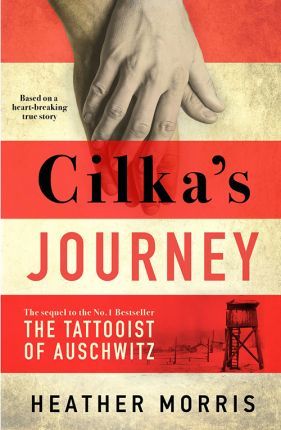Book Review of Cilka's Journey - sequel of the Tattooist of Auschwitz
In Cilka’s Journey, the sequel of The Tattooist of Auschwitz, Helen Morris explains how Lale, that tattooist survivor of the first story, revealed to her that Cilka was the bravest person he knew in the camp. This left Morris with a whole new life-story that needed telling. As many of Morris’s readers also wanted to know what had happened to Cilka, she researched and wrote about what happened to Cilka after the end of the war. Morris had a limited amount of factual information to draw upon, but used what she and researchers found to weave a historical memoir/historical account of Cilka’s life story. Some parts Morris changed in order to preserve the anonymity of some of the survivors so the finished novel is a hybrid of historical fact and fiction.

When we meet Cilka, introduced to us, in the Tattooist of Auschwitz Cilka is repeatedly raped by two senior SS officers. Cilka had entered the camp when she was only 16 an, in her own words, did what she needed to do in order to survive. She had accepted the advances of the SS officers as a life saving strategy and consequently received favours and some privileges in the camp. Ultimately Cilka hadn’t any choice in having been singled out by the officers, but nevertheless felt great shame about how she had survived. From what I recall from reading the Tattooist of Auschwitz (it was a while ago now) she had the additional role of hut leader and worked with the guards in loading the women onto the trucks that would take them to the gas chambers. In this role she feigned toughness -speaking and acting harshly towards her fellow Jewish inmates as a cover up, so that they would actually be spared from receiving far worse barbaric treatment from the male guards than that she administered. How a reader feels about Cilka’s actions, I guess, determines how they will feel about the sequel novel, which traces Cilka’s life, post Auschwitz during the ten years she spent sentenced to hard labour in the Gulag Camp. She had been sentenced as a traitor to Slovakia for sleeping with the Nazis and served time amongst political prisoners, desperate women stealing to feed their families and political dissidents.
On the one hand as a novel Cilka’s Journey is frequently moving, powerful and heart-breaking. We learn of further gang rapes, cruel conditions, mothers separated from their children and in-fighting between the inmates leading to solitary confinement in inhumane conditions. We follow Cilka’s life as she was once again singled out and trained to become a nurse to the other prisoners. Rather like Kristin Hanna’s The Nightingale the writing is very accessible and is a page-turner. I defy any reader to no not care what happens to Cilka at the end of the novel. On the other hand the character portrayal is, and perhaps it has to be, quite one-dimensional. The question of ‘right and wrong’ in the novel is clear and obvious, but I feel that opportunities are missed to really develop the protagonist’s personality and those she has contact with. The bullies’ behaviour is excused and explained away as inevitably being part and parcel of having to endure such hardship and quickly forgiven, as shown through the portrayal of Hannah. To be fair to the author, the characters are presented as ‘closed up’, for all kinds of reasons, Cilka, can’t talk about her own past, so perhaps it is the reader who is at fault for wanting more. It is difficult to pinpoint how this ‘closed up’ feeling manifests itself, but, perhaps through the considerable use of the telling of how the characters feel and how the reader should feel towards them comes across as stifling.
As the story traces Cilka’s life, where she served two thirds of her sentence before being released during Khrushchev’s regime, the reader is left in no doubt of the author’s own sympathy towards Cilka. This is fair but in some respects this lack of ambiguity presented makes the story seem flatter than it might otherwise. As a style of writing this is fine for a historical account, but less grabbing for a memoir The text can come over across as didactic and almost seems to discourage the reader from thinking independently about the issues explored.
Book Discussion Questions for Cilka's Journey
Cilka finds herself unable to avoid being singled out in both Auschwitz and The Gulag. Why do you think this is?
Explore the portrayal of Cilka’s character. What are her strengths and weaknesses? How realistic is the portrayal of her?
Cilka falls in love, without ever really speaking to Alexandre. This part of the account is complete fiction. Do you find the ending realistic?
How was your knowledge and understanding of the post war Russian regime developed through reading the text? Did you learn anything that surprised you?
Would you have sacrificed your chance of freedom, as Cilka did, so that Josie wasn’t separated from her child?
How successful a sequel to The Tattooist of Auschwitz did you find Cilka’s Journey?
What questions would you ask Cilka if she was in the room with us today?
Cilka was responsible for putting her mother onto the truck that would go on to take her to the gas chamber? Do you think this was the correct decision to make?
The book is part historical fiction and part memoir. The author is clearly very sympathetic towards Cilka. What is your own attitude towards Cilka and why?
Which of the women in Cilka’s hut do you have the least sympathy for and why?
Which book do you prefer – the Tattooist of Auchwitz or Cilka’s journey. Discuss the reasons for your preferences.
Book Club Questions for Cilka's Journey (if you haven't read the book.)
Cilka is portrayed as having had to be extremely cruel to be kind. Are there any other literary figures or real people who have had to take on the persona of ‘monster’ to actually protect the weak. Would you be able to take on this role?
How effective a tool do you find memoir or historical fiction as a means of gaining insight into historical eras or movements? Discuss the reasons for your opinion.
Reading stories of war and suffering is inevitably upsetting and disturbing. Why are we drawn to books like this?
What other books and TV shows do you think successfully explore the hardship of war, confinement and prison?
Sometimes in Cilka’s Journey it is the tiniest act of kindness that make life bearable for the prisoners. Do you have a personal story about a ‘small kindness’ that you’ve either received or given?
Cilka’s Journey is a straightforward linear narrative pulling out highlights (or lowlights) of her life, which quite factually shows what happens to her. Explore as a reading group what you feel a book’s primary purpose is and how this influences your group’s book choice preferences.

Summing up of Cilka's Journey by Heather Morris.
I resisted reading Cilka’s Journey, the sequel to The Tattooist of Auschwitz for quite a while, as I was afraid it wouldn’t be as good as the original story. Now I’m finished with the reading I am unsure about whether it did match up. Cilka’s Journey is a page-turner, and we do get some insight into her life. I’d definitely recommend it and it is a great read. I’d put it on par with other books I’ve reviewed for sure. Overall I’m not completely convinced, though, by Morris’ portrayal of Cilka as selfless and giving person whose main purpose, during the time in the Gulag, was to make life more bearable for others. Cilka’s shame never leaves her and the writer is at pains to repeatedly remind the reader that Cilka is blameless for her earlier life choices. I think the key message being portrayed is that for the vast majority survival is everything. Morris does clearly show that people have great ability to be both monsters and angels. but in doing so it does feel like the reader is being presented with selected highlights, which they are encouraged to unquestionably accept as ‘the truth’.